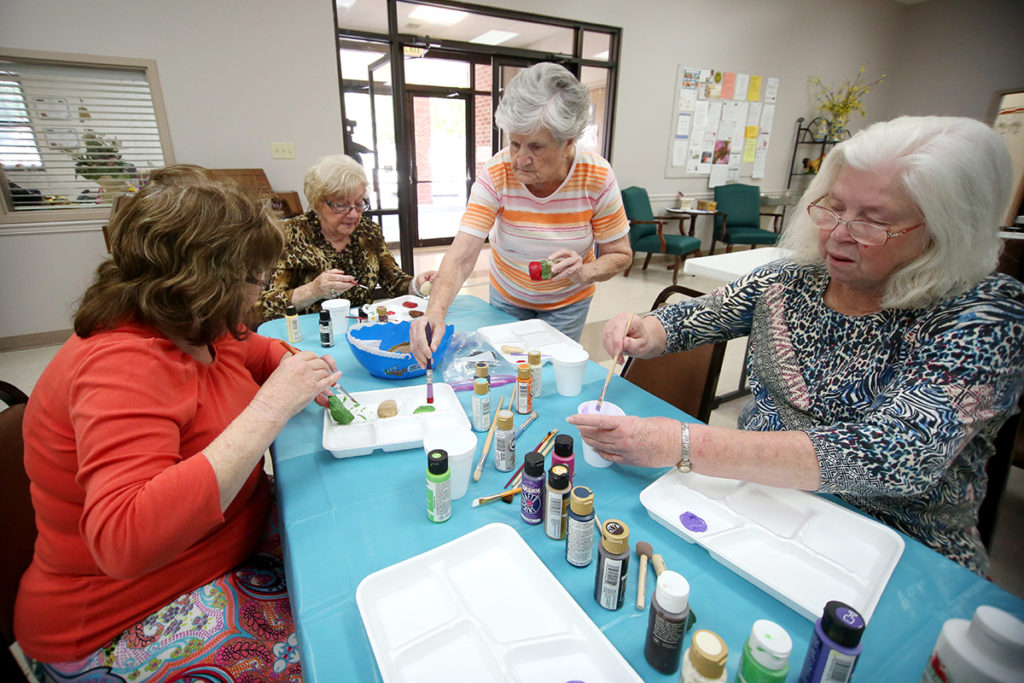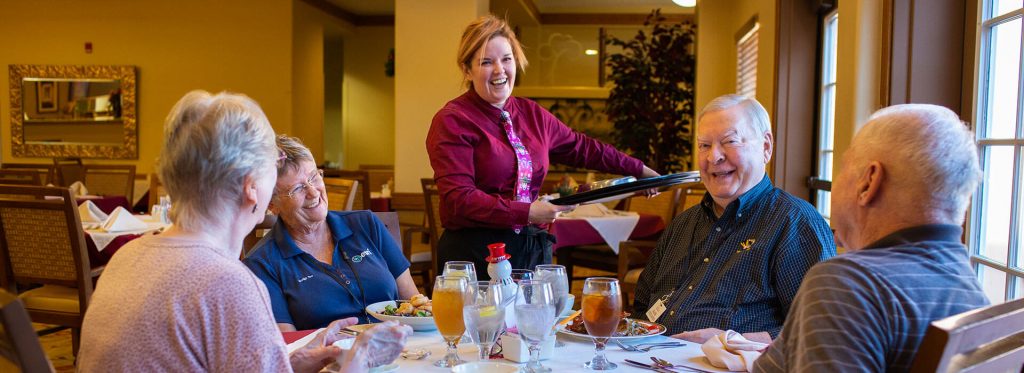Senior Housing Placement

There are many senior housing placement options to consider and choose from. At “zero” cost to you or your loved one we will actively engage in assessing finances both short and long-term to determine financial longevity based on the trajectory of your pre-existing prognoses and the progression of those co-morbidities. We will strive to understand your personal bucket list and with your healthcare needs in mind filter using our proprietary matrix of on-going community surveys and your wants from your bucket list to determine a best fit community.
Senior housing comes in a variety of colors and flavors all designed to differentiate themselves both in types of care provided and types of lifestyles. While amenities might carry the most weight for one individual the standard of care might score more highly in importance for the next person. Just like any other type of real estate not all communities are created equally and often that is by design.
Below is an overview of the most common types of senior housing communities. They are described sequentially by order of ageing starting with Independent Living (“IL”) where care is not addressed, followed by Assisted Living; has multiple levels of care (“AL”), and lastly Skilled Long-Term Care around the clock care (“SNF”).
Senior Housing Placement Options
Types of Senior housing Communities
Independent Living…what does that look like?
If you’re used to an active lifestyle and are currently independent and don’t have a need for assistance with (ADLs) Activities of Daily Living like; (bathing, dressing, toileting, transferring (getting in and out of bed or chair), eating, and continence) then an independent living community might be a consideration.
In these environments, you can continue doing what you love: working out, golfing, going out, socializing with friends, etc. This condo or apartment setting allows you to provide the same level of activity you are already accustomed to. You are free to stay in your own place where you can cook, decorate, and entertain as you see fit.
Many senior independent living communities also employ an activities director who ensures there is always something exciting happening. Many children of older adults like this feature; especially for seniors who lack socialization in their life for any number of reasons. It could be a relocation after a spouse passing, late in life divorce, re-location to be near kids and grandkids, retirement destination, or single in need of companionship.
How can you decide if a senior independent living community is the best choice for you? If you are that senior, ask yourself these questions:
- Are you able to manage daily tasks by yourself? Examples are personal grooming, cooking, or managing medication.
- Do you wish to live an active life through a variety of activities?
- Do you love walking on beautifully landscaped grounds?
- Do you enjoy taking shopping or dining trips?
- Do you enjoy socializing with neighbors?
- Do you wish amenities like a movie theatre, restaurant meals, and wellness center are within an arm’s reach?
If you are a loved one, it might be time to consider senior housing if you are observing any combination of the following:
- Loss of a spouse or close friend
- Noticeable decline in personal hygiene
- Looking to downsize (head-off potential hording)
- Forgetfulness frequency
- Medication monitoring
- Unable to safely drive himself/herself
- Unable to maintain housekeeping and general maintenance
- Sudden or gradual decline in socialization
- Difficulty in connecting with friends and family
- General overall well being and mental health (depression)

Independent Living communities are perfect for seniors who are looking to make the most of their retirement experience but who can provide for their own needs, including activities of daily living. These communities provide a wonderful place to call home. Many communities are also pet-friendly, so you can bring your furry friend. You’ll get to enjoy on-site activities, off-site excursions, amenities such as a salon, fitness center, concierge medical services, and so much more!
Do you want to enjoy everything retirement has to offer without the hassle of things like mowing the lawn, cooking every meal, and cleaning the house?
As an independent living resident, you can let someone else handle the chores so you can do more of what you love. Maybe you want to spend more time on arts and crafts, learn how to play a musical instrument or attend morning yoga classes. Or you might want to join a book club, meet your friends for a resident social or go on excursions to local museums.
No matter how you want to spend your days, independent living gives you the chance to redefine what it means to be independent while enjoying an active lifestyle and pursuing your passions.
Assisted Living…what does that look like?
Why Choose Assisted Senior Living?
If you’re considering a move to an assisted living community (AL), you likely have some stipulations to prioritize for the community you choose. An AL will have licensed clinicians on campus to support your healthcare regimen. This type of senior housing community often doesn’t present any differently than an independent living community but provides the necessary services to support your ADL’s like; bathing, toileting, transferring, etc.
If you’re finding that activities of daily living are running your down, like housekeeping, house maintenance, or personal grooming are becoming difficult, you don’t have to keep struggling to keep up. Instead, you rely on the help you need while continuing to enjoy the activities you love. Regular housekeeping, 24/7 medical care, and help with medication management are just some of the services you’ll find in these communities. Your loved ones will have peace of mind knowing you are provided for and your health, medications, and spiritual wellbeing are being tended to by the qualified staff of assisted living communities.
Most communities have a daily schedule of activities and events, to ensure you never have a dull day. As mentioned before, not all communities are created equally. For example, while many, but not all, communities employ a full-time activities director. This person’s sole responsibility is to ensure you are entertained. While one community offers coloring books and Bingo routinely, another activities director has her residents’ building props for a play put on by the residents.
We know who these people are and which communities go out of their way to make living their priority. So, regardless of your physical or cognitive ability we maintain the on-going knowledge of what communities meet the ever evolving social dynamics at communities for a best personalized fit for you or your loved one.
Why Choose Assisted Senior Living?
Assisted living is designed for seniors who need a little more day-to-day assistance than residents in independent living. These communities often have programs and staff to provide support with everything from daily living assistance and basic care to recreational activities and transportation.
If you are a loved one, it might be time to consider senior housing if you are observing any combination of the following:
- Infrequent showering and bathing, unpleasant body odor, noticeable decline in grooming habits and personal care
- Poor diet or weight loss. Unexplained bruising
- Unexplained dents and scratches on a car
- Loss of interest in hobbies and activities. Changes in mood or extreme mood swings.
- Accumulations of unopened mail or an overflowing mailbox. Late payment notices, bounced checks and calls for collection
- Empty fridge and food pantry, spoiled food left out, dirty house, extreme clutter and dirty laundry piling up
- Mobility issues, trouble getting up from a seated position. Difficulty with walking and balance
- Forgetting to take medications – or taking more than the prescribed dosage
- Missing important appointments. Uncertainty and confusion when performing once- familiar tasks.
- Earlier stage diagnosis of dementia or early onset Alzheimer’s, Parkinson’s, ALS, MS, other progressive debilitating diagnosis
If you are a loved one, it might be time to consider senior housing if you are observing any combination of the following:
- Loss of a spouse or close friend
- Noticeable decline in personal hygiene
- Looking to downsize (head-off potential hording)
- Forgetfulness frequency
- Medication monitoring
- Unable to safely drive himself/herself
- Unable to maintain housekeeping and general maintenance
- Sudden or gradual decline in socialization
- Difficulty in connecting with friends and family
- General overall well being and mental health (depression)


Assisted Living can be an excellent choice for senior housing and a necessary decision depending on the progression of the seniors’ needs and the type(s) of needs, as not all seniors are created equally either. This is the reason for the variety of communities. It is ideally suited for seniors who could be frail, but do not need 24-hour medical nursing care. They sometimes need help with activities such as housecleaning, meals, dressing, and medication reminders and monitoring. The average assisted living resident is 84 years old and needs help with two or three of the (ADLs) mentioned above.
Some seniors move into assisted living because living alone may not be safe for them due to the risk of falling, increased memory difficulty, inability to food shop and prepare a nutritious meal, or the risk of taking the wrong medication or an incorrect dosage is concerning. It’s been our experience that a timely move into assisted living can help you avoid the need for a nursing home altogether.
Memory Care…what does that look like?
Memory Care Communities
Alzheimer’s and dementia can be challenging for everyone involved, causing you to feel a range of emotions or ask yourself questions like: What’s going to happen to my loved one’s health? How am I going to be able to care for them, and juggle a career, a spousal or child(ren)? The more you know what to expect and how to prepare, the more it can make the journey feel less daunting.
You don’t have to go through this alone. If you feel like you need outside assistance, memory care communities are a wonderful environment ideal for people with Alzheimer’s and dementia. In fact, studies show seniors living in memory care communities often experience a higher quality of life than at home. This is because most of the staff tending to you or your loved one has training in memory care and has varying education in geriatrics.
Dementia and other debilitating diseases with similar presentations often aren’t observable until later in life when there are other comorbidities. Our experience in senior housing and the elderly better equips us in filtering for a best fit community. Dementia and Alzheimer’s can present differently from one individual to another and at different times making it a moving target. Rest assured we have experience in serving seniors and can provide the necessary assistance to determine which memory care community is potentially the right environment for you or your loved one.
If you are a loved one, it might be time to consider senior housing if you are observing any combination of the following:
- Confusion with “Time or Place”
- Challenges in“Planning or Problem Solving” easily frustrated
- Withdrawal from work or social activities
- Changes in mood and personality (Bi-Polar traits)
- Memory loss that disrupts daily life
- Misplacing things constantly and inability to retracesteps
- New problems with words bothspeaking or writing
- Trouble understanding visual images and spatial relationships
- Decreased or poor judgment
- Buying unnecessary items and forgetting they bought them or repetitive purchases of the same items unnecessarily
- Difficulty completing familiar tasks
- Forgetting faces, names and places (only has recall of distant memories)

Memory care programs feature a person-centered approach that’s designed to help your loved one feel a sense of belonging and purpose, while still preserving their sense of self. Good ones will have written programming protocols designed by medical and educational professionals all with the purpose of stimulating the brain to mitigate the diseases progression. One way this is accomplished is through a commitment to consistent care assignments of the same associates to your loved one whenever possible. You will hear from professionals that frequency and consistency of routine and regimen are critical and impactful to people with these diseases. We can’t agree more. Hence why it is important to understand one community hire practices over another and what differentiations each senior housing company makes in establishing their employment criterion.
Continuing Care Retirement Communities (CCRC) also referred to in certain parts of the country as “Life Plan Communities”
What is a “CCRC”…what does that look like?
CCRC’s are senior housing retirement communities with accommodations for independent living, assisted living, and nursing home care offering residents a continuum of care. While many senior living communities offer independent, assisted, memory, and even skilled care all within one campus you can find yourself on a waiting list based on the availability of a unit to become available as your age justifies the next level of care based on need. You are also guided by a new contract and that then costs of care and the room and board costs as you age in place on the same campus.
CCRC’s are different in that they require an upfront buy-in, which can be significant for most people. Depending on your age, needs, and net worth you can determine if a CCRC is an option for you. While many CCRC’s caters to luxury lifestyles there are both pros and cons to each like most everything in life, but determining if a CCRC is right for you is often determined by the upfront buy-in commitment.
Advantages of CCRC’s
- It offers independent living with various residential options, like condominiums, cottages, duplexes, and studios.
- It ensures access to onsite advanced healthcare support, such as assisted living and memory care.
- It provides flexibility for spouses or partners needing different levels of medical or personal care.
- It increases social engagement and expands a senior’s social network with a wide range of activities and amenities.
- It creates a maintenance-free lifestyle, as cooking, cleaning, house, and yard work are provided.
- It offers potential tax benefits.
- It provides peace of mind and security for the residents and their caregivers.
Disadvantages of CCRC’s
- There are substantial entry and monthly service fees.
- It requires intense planning, including guidance from a financial advisor and lawyer.
- There are complex contracts.
- There's a risk of financial loss should the CCRC go bankrupt due to a real estate crisis or recession.
- There could be waitlists or limited housing choices and locations due to high demand.
- Applicants must meet physical and cognitive health requirements to be eligible.
- Members do not own the place of residence; they are paying to live there and receive care and amenities.
The primary advantage is the wide range of care, services, and active lifestyle offering all at a single location with stability of staff regardless of health condition. This allows you or your loved one to remain among the same people and familiar surroundings they’ve grown to know. The potential disadvantage is the cost can be prohibitive for many due to the upfront outlay. The amount you pay depends on the size of your residence, how many people live there, and the range of services and amenities available in your level of living: independent living, assisted living, memory care or skilled nursing.
There are multiple types of CCRC contracts:
In this overview we describe the five most common types of CCRC contract types. These contracts can vary from one community to another and may not all be offered at each community—though it is not uncommon for a Lifecare community to offer more than one of these contracts. To help you on your search, here is an overview of each type of CCRC contract.
- Type-A (Lifecare)
A Type-A contract requires the highest monthly fee for residents living independently and could also have a higher entry fee. Depending on the community, the balance in paying higher fees for independent living is that the residential services, amenities and higher levels of care services (such as assisted living or skilled nursing) are provided with little or no increase in monthly fees. Basically, the resident with the Type-A Lifecare contract is prepaying for health care services that may be needed in the future.
- Type-B (Modified)
In comparison to the Type-A contract, a Type-B contract requires a lower monthly fee and possibly a lower entry fee. Type-B contracts may also include almost all of the same residential services that a Type-A offers. The difference is if higher levels of care is needed, the resident will be responsible for some of the cost.
- Type-C (Fee-for-Service)
Compared to the Type-A and Type-B contracts, a Type-C contract would provide the lowest monthly fees and possibly the lowest entry fee. However, if assisted living or skilled nursing is required in the future, the resident’s monthly fees will likely increase to reflect the market rate of care. Some or all of the residential services and amenities may be included.
- Rental
A rental contract may require no entry fee or a small “community fee.” These contracts typically include a month-to-month fee which may be higher than what you would pay for an entry fee with a Type-A or Type-B contract. As with a Type-C contract, you will pay the full market rate for healthcare. However, residents under this contract might have priority access to the healthcare facility as opposed to guaranteed access.
- Equity/Co-Op
This type of contract involves the purchase of real estate or ownership in a co-op. An entry fee is typically not required since the home is purchased, but a monthly service fee is still required. Higher levels of health care are available on a fee-for-service basis at the full market rate or at a discount.
The most important difference is that CCRCs recognize that many seniors want to live as independently as they always have. For example, let’s say you’re an older adult who lives alone. You can still live independently, but you spend more time alone than you’d like. To remedy this, you can move into the independent living component of a CCRC. There, you can maintain the same hobbies and interests you enjoyed previously while also living close to those who can help when there is a need. You’ll establish a community for yourself as you get to know the area, the people, and your neighbors. As you get older, you may find tasks like cutting the grass or mopping the floors are a bit difficult. This is when moving into or utilizing the assisted living components of the CCRC is a good option. Unlike in a traditional assisted living community, you’ll already know the community and the people; you’re not moving to a new community, just into a different area (in some cases) or getting a bit more help when you need it. When you do have the need, you can move into the onsite nursing facility component. Again, you maintain the same quality of life and stay in familiar areas.
Usually, this type of location offers customizable services to fit the individual’s needs at that point in their life. This ensures the very best level of care is always available.
Is a Continuing Care Retirement Community Right for Me?
A CCRC delivers a multitude of benefits in one location. In addition to comparing contracts and weighing the pros and cons of a CCRC, ask yourself these questions:
- Am I ready to spend the rest of my life in a continuing care retirement community?
- Do I have the financial resources available to “buy into” a CCRC?
- Am I able to move past the emotional attachment of selling my current home?
- Do I feel isolated in my current home due to my spouse’s passing or the lack of family nearby?
Would maintenance-free living improve my quality of life?

